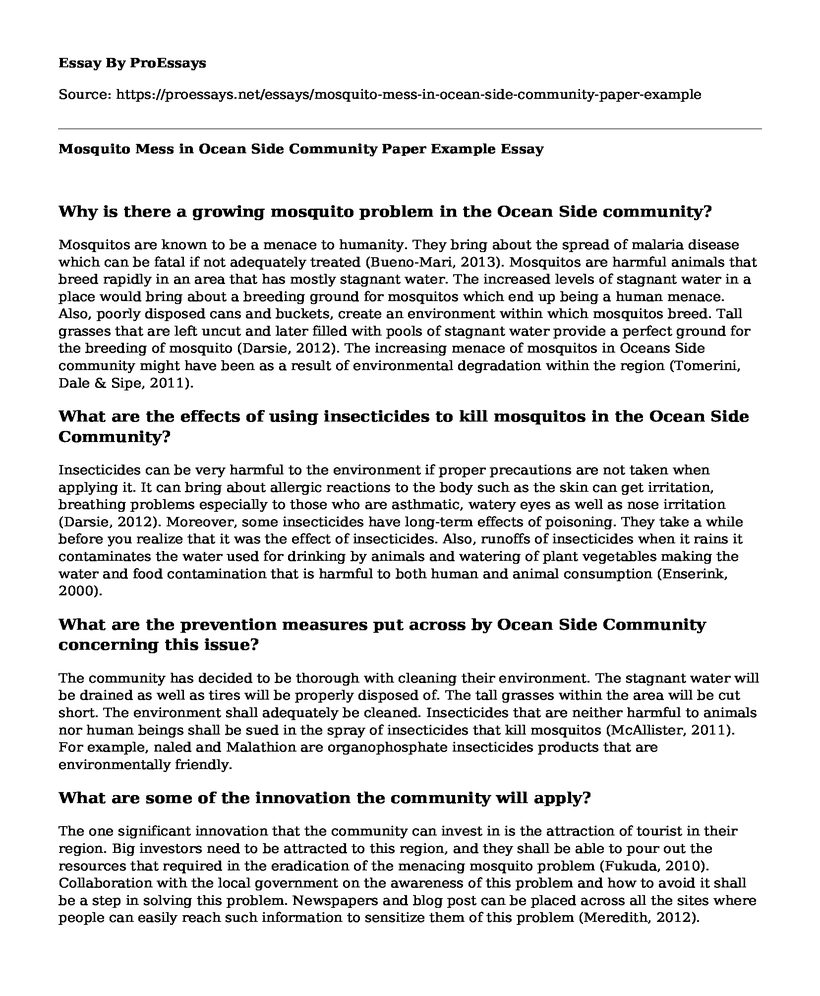Why is there a growing mosquito problem in the Ocean Side community?
Mosquitos are known to be a menace to humanity. They bring about the spread of malaria disease which can be fatal if not adequately treated (Bueno-Mari, 2013). Mosquitos are harmful animals that breed rapidly in an area that has mostly stagnant water. The increased levels of stagnant water in a place would bring about a breeding ground for mosquitos which end up being a human menace. Also, poorly disposed cans and buckets, create an environment within which mosquitos breed. Tall grasses that are left uncut and later filled with pools of stagnant water provide a perfect ground for the breeding of mosquito (Darsie, 2012). The increasing menace of mosquitos in Oceans Side community might have been as a result of environmental degradation within the region (Tomerini, Dale & Sipe, 2011).
What are the effects of using insecticides to kill mosquitos in the Ocean Side Community?
Insecticides can be very harmful to the environment if proper precautions are not taken when applying it. It can bring about allergic reactions to the body such as the skin can get irritation, breathing problems especially to those who are asthmatic, watery eyes as well as nose irritation (Darsie, 2012). Moreover, some insecticides have long-term effects of poisoning. They take a while before you realize that it was the effect of insecticides. Also, runoffs of insecticides when it rains it contaminates the water used for drinking by animals and watering of plant vegetables making the water and food contamination that is harmful to both human and animal consumption (Enserink, 2000).
What are the prevention measures put across by Ocean Side Community concerning this issue?
The community has decided to be thorough with cleaning their environment. The stagnant water will be drained as well as tires will be properly disposed of. The tall grasses within the area will be cut short. The environment shall adequately be cleaned. Insecticides that are neither harmful to animals nor human beings shall be sued in the spray of insecticides that kill mosquitos (McAllister, 2011). For example, naled and Malathion are organophosphate insecticides products that are environmentally friendly.
What are some of the innovation the community will apply?
The one significant innovation that the community can invest in is the attraction of tourist in their region. Big investors need to be attracted to this region, and they shall be able to pour out the resources that required in the eradication of the menacing mosquito problem (Fukuda, 2010). Collaboration with the local government on the awareness of this problem and how to avoid it shall be a step in solving this problem. Newspapers and blog post can be placed across all the sites where people can easily reach such information to sensitize them of this problem (Meredith, 2012).
How will the monitoring be done during the process of eradicating mosquitos?
A capture-recapture method can be used in the estimation of the number of mosquitos in the Ocean Side Community. This will enable the health institution to be aware of the number of insecticides that will be used in this operation (McAllister, 2011). Also, the local government can provide weekly reports on the progress with the process of eradication of mosquitos in the area. The health institution will conduct a community health education program across Ocean Side. Mobilizing of volunteers within the area who have a higher incidence of contracting mosquito-borne diseases. It would also be thoughtful for a clinical walk around the community to test the patients for any potential illness and treatment if any (Enserink, 2000).
References
Bueno-Mari, R. (2013). Looking for new strategies to fight against mosquito-borne diseases: toward the development of natural extracts for mosquito control and reduction of mosquito vector competence. Frontiers In Physiology, 4. doi: 10.3389/fphys.2013.00020
Darsie, R. (2012). Description of Himalayan Mosquito Pupae III, Ochlerotatus albolateralis and Ochlerotatus deccanus. Journal Of The American Mosquito Control Association, 28(1), 9-14. doi: 10.2987/11-6188.1
Enserink, M. (2000). MOSQUITO ENGINEERING: Building a Disease-Fighting Mosquito. Science, 290(5491), 440-441. doi: 10.1126/science.290.5491.440
Fukuda, T. (2010). Harold Clyde Chapman: a Loyal Friend to the American Mosquito Control Association1. Journal Of The American Mosquito Control Association, 26(4), 452-457. doi: 10.2987/8756-971x-26.4.452
McAllister, J. (2011). American Mosquito Control Association Presidential Address: Association Activities in 2010-111. Journal Of The American Mosquito Control Association, 27(3), 187-190. doi: 10.2987/8756-971x-27.3.187
Meredith, W. (2012). Some Reflections Upon and Challenges Ahead for Mosquito Control1. Journal Of The American Mosquito Control Association, 28(2), 75-78. doi: 10.2987/12-6247.1
Tomerini, D., Dale, P., & Sipe, N. (2011). Does Mosquito Control Have an Effect on Mosquito-Borne Disease? The Case of Ross River Virus Disease and Mosquito Management in Queensland, Australia. Journal Of The American Mosquito Control Association, 27(1), 39-44. doi: 10.2987/10-6038.1
Cite this page
Mosquito Mess in Ocean Side Community Paper Example. (2022, Sep 22). Retrieved from https://proessays.net/essays/mosquito-mess-in-ocean-side-community-paper-example
If you are the original author of this essay and no longer wish to have it published on the ProEssays website, please click below to request its removal:
- Paper Example on Increasing Violence towards Police Officers in the US
- Case Study E-Waste Paper Example
- Biodiversity Loss Essay Example
- Research Paper on Communication and Climate Change
- Harnessing Renewable Energy With Biomass: An Overview
- Data Recovery Plan: Formal Risk Assessment and Testing - Essay Sample
- Estimate Cost of Foundation Laying - Essay Sample







